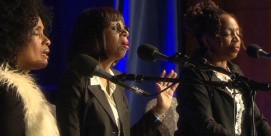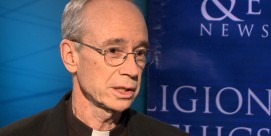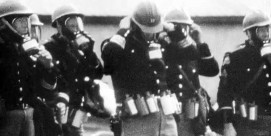Andrew Finstuen: Land of the Free, Home of the Exceptionalists?
Glenn Beck’s Restoring Honor rally was a giant civil religious celebration of American exceptionalism.
Beck began his event by referring to America as a chosen nation. Pastor Paul Jehle, who offered the opening prayer, reinforced Beck’s sense of America’s divine purpose by drawing upon Puritan John Winthrop’s immortalized call for America to be a “city on a hill.”
Historians have very little use for the idea of American exceptionalism and its supporting religious rhetoric. The historical record points not to the exceptional experience of America but to its common history with other nations. America is, after all, a nation of immigrants, and it is one shaped by both transatlantic and transpacific exchanges. Apart from this historical challenge to American exceptionalism, insistence upon the nation’s unique greatness raises the specter of America’s exceptionally violent history and culture. Not only was America among the slowest of nations to abolish slavery, it is well known that America’s violent crime rate and prison population exceed that of any other industrialized country on the planet.

Yet these are not the only problems with the exceptionalism narrative. Exceptionalists like Beck claim that colonial America was a haven of religious practice and freedom that anticipated the founding of the United States on Christian principles and religious tolerance. While respected historians affirm the importance of Christianity in early America, they have also demonstrated that both colonists and the first citizens of the new United States subscribed to a variety of faiths—or none at all. They have shown that figures such as George Washington, John Adams, James Madison, Thomas Jefferson, and Benjamin Franklin may have been sympathetic to Christianity, but they were hardly orthodox Christians.
Colonial Americans, moreover, were not exceptionally tolerant of religious dissenters. Prior to the writing of the free exercise clause of the First Amendment to the United States Constitution, Puritan and Anglican state churches dominated colonial religious life, and they actively limited the free expression of groups such as the Quakers and the Baptists. Even with the free exercise clause in place, Americans practiced toleration fitfully. This is why Catholics were considered by a substantial number of Americans to be un-Christian and un-American well into the 1960s and why the Church of Jesus Christ of Latter-day Saints is headquartered in Salt Lake City, Utah. The recent controversy about the proposed mosque near Ground Zero is simply the latest episode in America’s checkered history of religious freedom and “tolerance.”
These historical realities have no effect on Beck and other proponents of exceptionalism because their vision of America depends upon a combination of historical amnesia and revisionist history. For example, Beck repeatedly implored Americans to focus not on the “scars” of history but on the good America has done and will do. It was the height of irony for Beck to ask Americans to forget the scars of our past on the anniversary of Martin Luther King Jr’s “I Have a Dream” speech—and in the shadow of memorials to Abraham Lincoln, World War II, the Vietnam War, and the Korean War. Americans visit these sites precisely to remember, to grieve, and to honor the scars left by the horrors of assassination, slavery, and war.
There was one brief moment, however, when Beck’s comments matched the gravity of the American past. Midway through the program he noted: “America has been both terribly good and terribly bad.” He followed this comment with a vague admonition to learn from and repair the bad, only to quickly return to his message about American greatness. Had Beck sustained this theme of the ambiguity of American history he would have been more faithful to the spirit of Abraham Lincoln and Martin Luther King Jr, the two figures who loomed largest over the proceedings. Lincoln’s and King’s rhetoric—especially the Second Inaugural and the “I Have a Dream” speech—were premised on a full acknowledgment of the good and bad of American experience. They understood that national “scars” represent both injury and healing, and they knew that to dismiss the injury precludes the healing.
Lincoln and King are exceptional historical figures. They had an exceptional grasp of the greatness and misery of the American past. They had an exceptional sense of caution when they spoke of God in relation to American destiny. They had an exceptional vision of American promise. More Americans should follow their exceptional example.
Andrew Finstuen is director of the Honors College and associate professor of history at Boise State University. He is the author of “Original Sin and Everyday Protestants: The Theology of Reinhold Niebuhr, Billy Graham, and Paul Tillich in an Age of Anxiety” (University of North Carolina Press, 2009).







